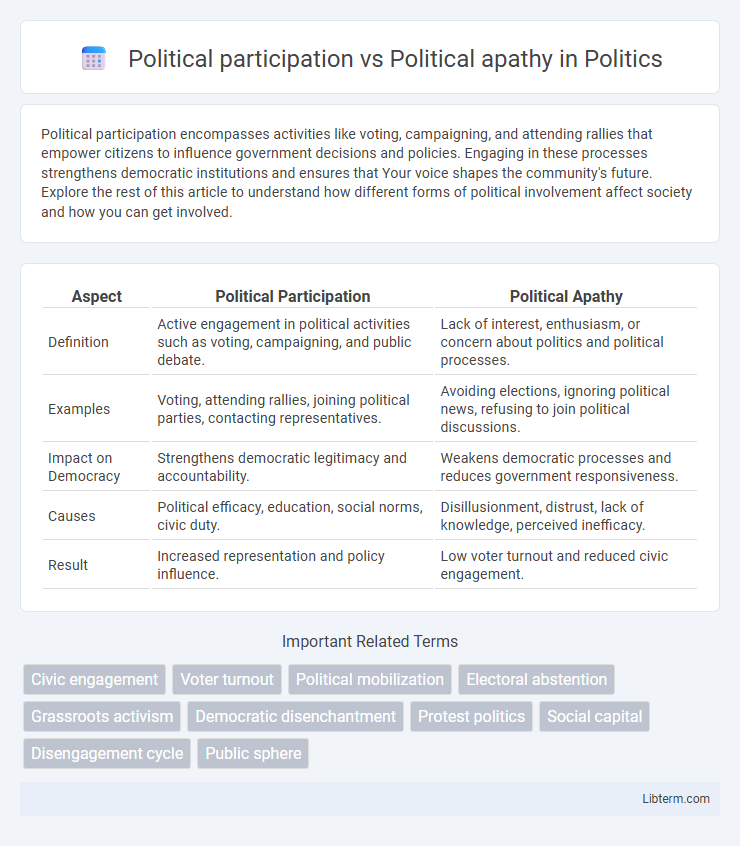Political participation encompasses activities like voting, campaigning, and attending rallies that empower citizens to influence government decisions and policies. Engaging in these processes strengthens democratic institutions and ensures that Your voice shapes the community's future. Explore the rest of this article to understand how different forms of political involvement affect society and how you can get involved.
Table of Comparison
| Aspect | Political Participation | Political Apathy |
|---|---|---|
| Definition | Active engagement in political activities such as voting, campaigning, and public debate. | Lack of interest, enthusiasm, or concern about politics and political processes. |
| Examples | Voting, attending rallies, joining political parties, contacting representatives. | Avoiding elections, ignoring political news, refusing to join political discussions. |
| Impact on Democracy | Strengthens democratic legitimacy and accountability. | Weakens democratic processes and reduces government responsiveness. |
| Causes | Political efficacy, education, social norms, civic duty. | Disillusionment, distrust, lack of knowledge, perceived inefficacy. |
| Result | Increased representation and policy influence. | Low voter turnout and reduced civic engagement. |
Understanding Political Participation
Political participation encompasses activities such as voting, campaigning, attending protests, and engaging in community discussions that influence government decisions and policies. Understanding political participation involves analyzing factors like socioeconomic status, education, political efficacy, and access to information, which significantly impact individuals' likelihood to engage in political processes. High levels of political participation strengthen democratic systems by promoting representation and accountability, whereas political apathy, characterized by indifference or disengagement, undermines these principles and weakens civic involvement.
Defining Political Apathy
Political apathy refers to the lack of interest, enthusiasm, or concern individuals have toward engaging in political processes such as voting, activism, or public discourse. It is characterized by indifference to political events, parties, and policies, often resulting in low voter turnout and minimal civic involvement. Understanding political apathy is crucial for addressing the challenges of democratic participation and fostering a more engaged citizenry.
Historical Trends in Civic Engagement
Historical trends in civic engagement reveal fluctuating levels of political participation and political apathy across different eras. During periods of social upheaval and reform, such as the Civil Rights Movement in the 1960s, voter turnout and activism surged, reflecting heightened political participation. Conversely, the late 20th and early 21st centuries witnessed growing political apathy, marked by declining voter turnout and reduced involvement in traditional political activities, influenced by factors like political polarization and disenchantment with government institutions.
Factors Influencing Political Involvement
Socioeconomic status, education level, and access to information significantly influence political participation, with higher education and income correlating to increased voter turnout and civic engagement. Psychological factors such as political efficacy and trust in government also determine levels of involvement, where low efficacy often leads to political apathy. Structural barriers like voting laws, registration difficulties, and media representation further impact the willingness and ability of individuals to engage in political processes.
Consequences of Political Apathy
Political apathy results in lower voter turnout, weakening the legitimacy of elected governments and diminishing the accountability of public officials. Reduced political participation fosters unequal representation, as marginalized groups often face further disenfranchisement and lack of policy advocacy. Persistent apathy can erode democratic institutions, leading to increased political instability and the potential rise of authoritarianism.
The Role of Education in Political Awareness
Education plays a crucial role in enhancing political participation by increasing individuals' understanding of political systems, rights, and responsibilities, thereby reducing political apathy. Studies show that higher levels of education correlate with greater engagement in voting, activism, and public discourse, as informed citizens are more likely to recognize the impact of their involvement. Civic education programs and critical thinking skills further empower individuals to analyze political information, fostering sustained political awareness and active participation.
Social Media’s Impact on Political Attitudes
Social media platforms significantly shape political participation by amplifying political discourse and enabling rapid information sharing, thus encouraging civic engagement among younger demographics. However, the same platforms can foster political apathy through the spread of misinformation, echo chambers, and digital fatigue, reducing users' motivation to actively participate in traditional political processes. Studies indicate that while social media can mobilize grassroots movements, it simultaneously contributes to polarized attitudes and disengagement when users encounter overwhelming or conflicting political content.
Bridging the Gap: Encouraging Participation
Bridging the gap between political participation and political apathy requires targeted strategies that foster civic engagement through education, accessible voting processes, and inclusive dialogue. Community programs that highlight the impact of individual votes and promote diverse representation significantly increase voter turnout and grassroots activism. Technology platforms and social media campaigns play a crucial role in mobilizing young voters and marginalized groups, transforming apathy into active political involvement.
Youth Perspectives on Politics
Youth perspectives on politics reveal a stark contrast between high political participation and widespread political apathy. While engaged young voters actively influence elections and policy discussions through social media campaigns and grassroots organizing, many express distrust in traditional political institutions, leading to voter abstention and disengagement. Factors such as education, socioeconomic status, and digital connectivity significantly shape youth involvement in political processes worldwide.
Future Implications for Democracy
Political participation, characterized by voter engagement, activism, and public discourse, strengthens democratic institutions by promoting accountability and diverse representation. In contrast, political apathy, marked by voter disengagement and mistrust in government, risks undermining democratic legitimacy and fostering authoritarian tendencies. Future democratic stability depends on increasing political participation through education, transparency, and inclusive policies to counteract the adverse effects of widespread apathy.
Political participation Infographic

 libterm.com
libterm.com